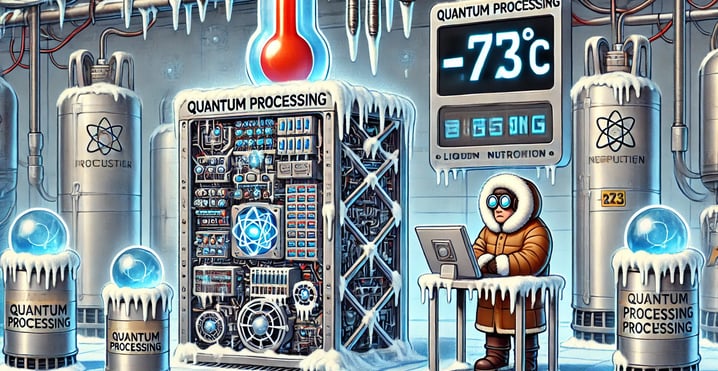Are Quantum Computers a Threat to Bitcoin?
While many fear that quantum computing could break Bitcoin’s security, this article explores why the threat is overstated and how cryptographic advancements ensure Bitcoin’s resilience in a post-quantum world.
4 min read


Are Quantum Computers a Threat to Bitcoin?
So, you’ve probably heard the doomsday talk—“Quantum computers are coming, and they’re going to break Bitcoin!” But before you go panic-selling your satoshis, let’s take a deep breath and look at the facts.
Yes, quantum computers are real. Yes, they’re mind-blowingly powerful. And yes, they could theoretically crack Bitcoin’s encryption. But guess what? If that happens, Bitcoin will be the least of the world’s problems.
Let’s break it down.
Bitcoin Security: A Quick and Dirty Explanation
Bitcoin is like Fort Knox, but instead of bricks of gold, it’s secured by some of the best cryptography on Earth. Two major pieces make it rock-solid:
1. ECDSA (Elliptic Curve Digital Signature Algorithm) – This keeps your Bitcoin wallet locked up tight. Your private key is like a secret password that only you (hopefully) know, and it generates a public key without revealing your private one.
2. SHA-256 (Secure Hash Algorithm 256-bit) – This is what miners use to secure transactions and build Bitcoin blocks. It’s basically an insanely complex math puzzle that takes an enormous amount of computing power to solve.
So, what’s the problem? Quantum computers don’t play by the rules.
What Can Quantum Computers Do?
Quantum computers use qubits, which can be 0 and 1 at the same time (yeah, weird, I know). This lets them process calculations at speeds classical computers can only dream of.
Two algorithms make Bitcoin fans sweat a little:
1. Shor’s Algorithm – Could be used to crack ECDSA, meaning if your public key is exposed, a quantum computer could steal your Bitcoin by figuring out your private key. (Big yikes!)
2. Grover’s Algorithm – Speeds up brute-force attacks against SHA-256, but not by enough to make it a serious threat—yet.
Sounds scary, right? Well, hold on, because quantum computers today are babies compared to what’s needed to actually crack Bitcoin.
The Reality Check: Quantum Computers Are Still Weak AF
Right now, the most powerful quantum computers have a few hundred qubits. To break Bitcoin’s encryption, they’d need millions. That’s like saying you can punch through a concrete wall because you just learned how to break a toothpick.
For example:
Google’s Sycamore quantum computer has around 70 qubits.
IBM’s Eagle processor? 127 qubits.
How many qubits do we need to break Bitcoin? Oh, just a casual few million.
At this rate, we’re looking at decades—possibly even longer before quantum computers are a real threat to Bitcoin. And by then, we’ll probably all be flying around in self-driving Teslas that mine Bitcoin while we sleep.
Chill Factor: Quantum Computers Need to Be Super Cool
Here’s another fun fact: Quantum computers need to operate at temperatures close to absolute zero. We’re talking around 10-20 millikelvin—that’s -273.13 degrees Celsius or -459.63 degrees Fahrenheit.
Maintaining such frigid temperatures requires sophisticated and expensive cooling systems. It’s not like every hacker can just pop down to the local electronics store and pick up a quantum computer. These machines are massive, costly, and need to be colder than outer space to function.
So, the idea of quantum computers being a common tool for hackers is about as likely as finding a snowman in the Sahara.
Banks, Governments, and Spies Should Be More Worried
If quantum computers ever get strong enough to crack Bitcoin, they’ll also be able to rip through banking systems, government databases, military encryption, and even intelligence agencies like the CIA and NSA.
Think about it:
Banks use encryption to protect transactions and customer data. A quantum computer could expose trillions of dollars overnight.
Government institutions rely on cryptographic security to protect classified information. Imagine if hostile nations could just… read everything.
The entire internet depends on cryptographic protocols like RSA and TLS to secure websites, logins, and communication. Quantum computers could break those too.
If this happens, Bitcoin won’t be the first thing people are worried about. We’ll be too busy watching governments, banks, and intelligence agencies implode.
How Bitcoin Can Fight Back
Luckily, Bitcoin isn’t standing still. Developers have been thinking ahead and already have solutions in the works to make Bitcoin quantum-resistant before this becomes a real problem.
Here’s how:
1. Quantum-Resistant Cryptography – New encryption techniques like lattice-based cryptography and Lamport signatures can keep Bitcoin safe. If necessary, Bitcoin can fork and upgrade.
2. Avoid Address Reuse – This is easy. Just don’t send Bitcoin back to the same address you used before. If your public key never gets exposed, quantum computers can’t touch your private key.
3. Layer-2 Solutions – The Lightning Network, multisig wallets, and other tech can add extra protection by making transactions more complex for quantum computers to mess with.
So… Should You Worry?
Not yet. Quantum computers today aren’t even close to being a real threat. Right now, the most powerful quantum machines have a few hundred qubits—they’d need millions (or more) to crack Bitcoin. That’s decades away.
In the meantime, Bitcoin is already preparing. And honestly, if a quantum apocalypse does happen, the banking system, intelligence agencies, and most of the internet will get hit long before your Bitcoin wallet.
So, instead of worrying, maybe focus on stacking more sats while you still can. Because by the time quantum computers are powerful enough to break Bitcoin, we’ll probably be living in a totally different financial world anyway.
Final Thoughts
Quantum computers are cool, but they’re not breaking Bitcoin anytime soon.
If they do get powerful enough, the entire internet is in bigger trouble than BTC.
Bitcoin devs are already working on quantum-resistant upgrades.
Don’t reuse addresses. Just don’t.
Keep stacking Bitcoin and enjoy the ride.
Bitcoin has survived worse. It’ll survive this too. 🚀






